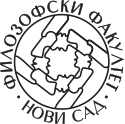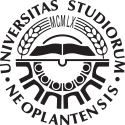15MKMK025 - Stylistics and Rhetoric
| Course specification | ||||
|---|---|---|---|---|
| Course title | Stylistics and Rhetoric | |||
| Acronym | 15MKMK025 | |||
| Study programme | Hungarian language and literature | |||
| Module | ||||
| Type of study | first degree undergraduate academic studies | |||
| Lecturer (for classes) | ||||
| Lecturer/Associate (for practice) | ||||
| Lecturer/Associate (for OTC) | ||||
| ESPB | 3.0 | Status | ||
| Condition | Oblik uslovljenosti | |||
| The goal | Articulation of the stylistics that becomes independent science. Providing stylistic insights to create a stylistic culture. Become familiar with the original and most important meanings of rhetoric. Presentation of history of rhetoric. An overview of the different tendencies of the new rhetoric | |||
| The outcome | The study of this course allows to understand the impact of classical rhetoric on development of new rhetoric. The student will be able to master the stylistic and rhetoric competencies related to reading and understanding literary texts. | |||
| Contents | ||||
| Contents of lectures | Stylistic directions, stylistic tendencies. Theoretical problems of periodization Style-based structure of literary work. Stylistic formation, stylistic pluralism. Stylistics of inter-textuality .. Rhetoric and stylistics. History of rhetoric. Aristotle, Quintilian. The history of Hungarian Rhetoric. Rhetoric of Roland Barthes. Neo-rhetoric. | |||
| Contents of exercises | Stylistic features of the text, stylistic interpretation. Rhetorical analysis. | |||
| Literature | ||||
| ||||
| Number of hours per week during the semester/trimester/year | ||||
| Lectures | Exercises | OTC | Study and Research | Other classes |
| 1 | 2 | |||
| Methods of teaching | Interactive teaching. Method of oral presentation. Method of writing (stylistic and rhetorical analysis). | |||
| Knowledge score (maximum points 100) | ||||
| Pre obligations | Points | Final exam | Points | |
| Activites during lectures | 5 | Test paper | ||
| Practical lessons | 35 | Oral examination | 60 | |
| Projects | ||||
| Colloquia | ||||
| Seminars | ||||

